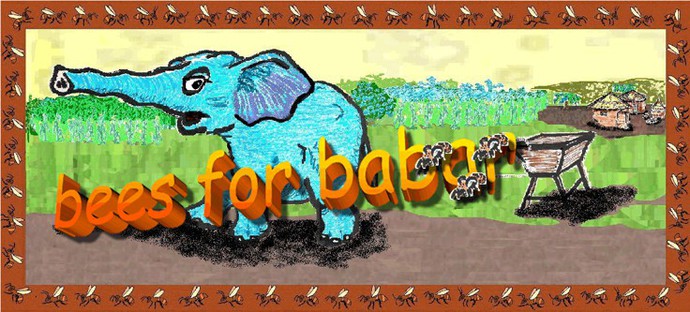BEES FOR BABAR SOCIETY
Registered Name: BEES FOR BABAR SOCIETY
Business No: 856875018RR0001
This organization is designated by Canada Revenue Agency (CRA) as a registered charity. They comply with the CRA's requirements and has been issued a charitable registration number.
BfB provides rotary credit to villagers to install hives around subsistence farms near the Mole wildlife reserve in Ghana.

The bees for babar society consists of a small number of volunteers in Canada reaching out to improve village life for subsistence farmers living in northern Ghana.
Our grassroots society provides micro loans tied to education and training to support small scale beekeeping in rural areas – in order to protect crops frequently destroyed by wildlife.
The word ‘babar’ in the Gonja language of northern Ghana, means “come to my aid”.
bees for babar … a project which promotes conservation, eco-tourism & beekeeping as income-generating activities in developing countries.
This idea first came to Mohammed Ali Ibrahim, a Ghanaian apiculturist, and Conrad Bérubé, a Farmer-to-Farmer volunteer, in 2003 while working on a beekeeper training program in Tamale, Damango District, Ghana.
They had noticed that when large animals, such as elephants, disturb African honeybees, the bees fiercely defend themselves by stinging the sensitive ears and nostrils of the disruptive animal. Once stung, the elephants quickly learn to avoid cultivated plots ‘protected’ by bee hives. Thus, the presence of hives reduces conflict between agricultural areas and wildlife coming from nearby parks. In this way, beekeeping can drastically reduce crop losses.
In addition, beekeeping provides other benefits; such as, providing supplemental income to farmers through increased crop productivity (due to increased levels of pollination), and the sale of honey and beeswax.
Ali and Conrad met with park personnel in MoleNational Park near Tamale, to discuss using bees to keep elephants away from garden plots and planted crops.
Protecting crops will protect wildlife
While elephants can cause considerable damage to crops and regenerating forests, other wildlife, such as impala and monkeys, can also cause losses. All animals can be ‘trained’ by honeybees to avoid these areas.
To protect gardens and crops, villagers sometimes shoot wildlife. Fewer animals will be killed, if they’re driven away by bees, and ‘trained’ to stay away by the ongoing presence of hives.
As wildlife conflicts are reduced, and individual farmers reap the benefits associated by increased crop security, the proximity of game reserves will be appreciated as an asset, rather than a liability. Since many villages are near national parks or game reserves, changed attitudes can lead to creased participation in the eco-tourism industry.
In this way, bees for babar hopes to promote and integrate wildlife appreciation and conservation with eco-tourism, increased food security, and supplemented incomes – by simply investing in bees and beekeeping.
ALL DONATIONS TO BfB GO INTO A ROTATING CREDIT FUND TO PURCHASE MATERIAL FOR THE CONSTRUCTION OF HIVES AND BEEKEEPING EQUIPMENT, AND TO TRAIN VILLAGERS IN BEEKEEPING AND RELATED BUSINESS SKILLS.
Low costs lead to big rewards
The Society is committed to responsible use of natural resources, including funds earmarked for stewardship of all resources. bees for babar is investigating ways to ‘make every dollar count.’
